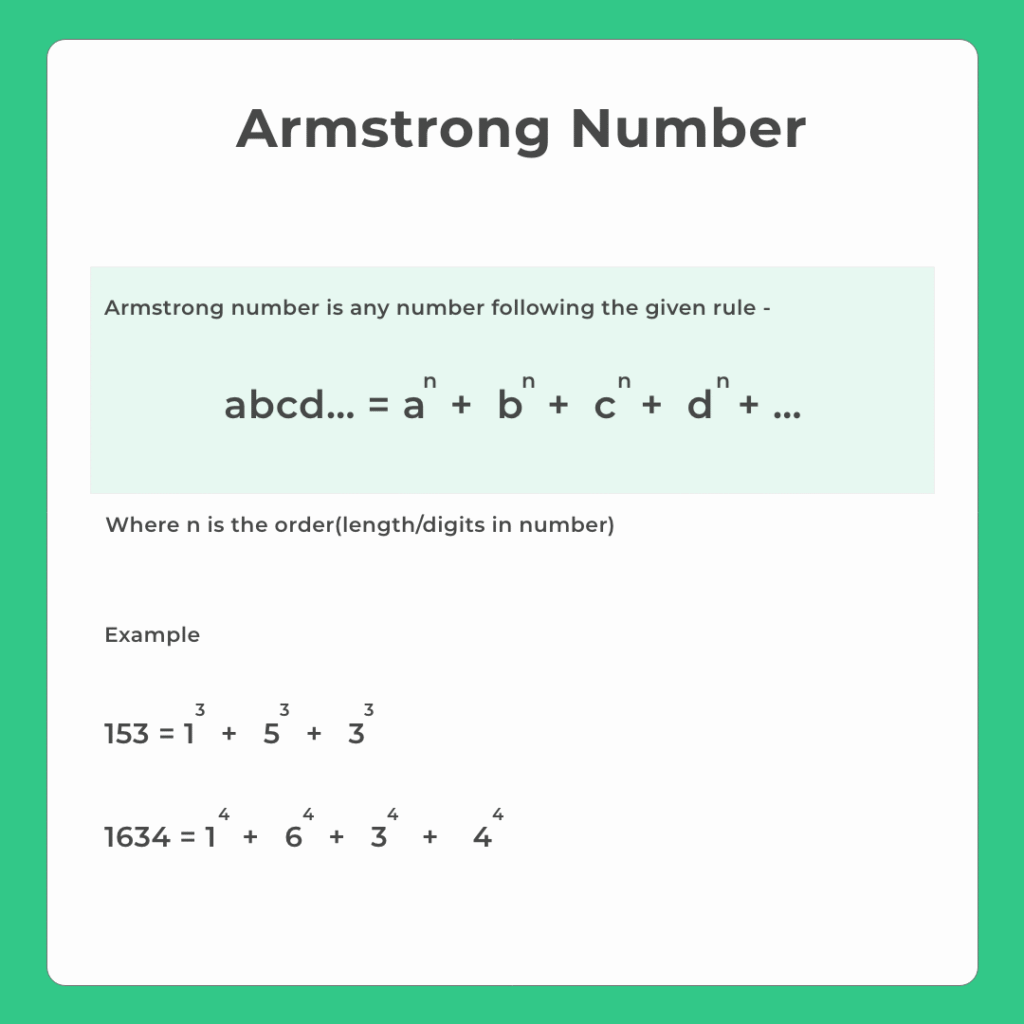C Program to check a Number is Armstrong or not
Program to check a number is Armstrong or not
In this program, we will find the number is Armstrong or not where the number should be entered by the user, we will look at different ways to write Armstrong number in C.
Most websites have given incorrect definitions/codes for Armstrong of a number.

Very Important
For Armstrong number in C on most websites, Armstrong number definition is given wrong. They all assume any number where the sum of the cubes of its digits is equal to the number itself is Armstrong Number.
However, Armstrong number is any number following the given rule –
- abcd… = an + bn + cn + dn + …
- Where n is the order(length/digits in number)
Also, Check Armstrong Number in a given Range in C

Example 1
Example = 153 (order/length = 3)
153 = 1^3 + 5^3 + 3^3 = 1 + 125 + 27 = 153
153 = 1^3 + 5^3 + 3^3 = 1 + 125 + 27 = 153
Example 2
Example = 1634 (order/length = 4)
1634 = 1^4 + 6^4 + 3^4 + 4^4 = 1 + 1296 + 81 + 256 = 1634
1634 = 1^4 + 6^4 + 3^4 + 4^4 = 1 + 1296 + 81 + 256 = 1634
C Code:-
Run
#include <stdio.h>
#include <math.h>
int order(int x)
{
int len = 0;
while (x)
{
len++;
x = x/10;
}
return len;
}
int getArmstrongSum(int num, int order){
if(num == 0)
return 0;
int digit = num % 10;
return pow(digit, order) + getArmstrongSum(num/10, order);
}
// Driver Code
int main ()
{
int num, len;
num=1634;
printf("The number is:%d\n",num);
// function to get order(length)
len = order(num);
// check if Armstrong
if (num == getArmstrongSum(num, len))
printf("%d is Armstrong", num);
else
printf("%d is Not Armstrong", num);
}
Output:-
The number is: 1634
1634 is Armstrong
Method 2
This method uses recursion in CCode
Run
#include <stdio.h>
#include <math.h>
// Armstrong number is any number following the given rule
// abcd... = a^n + b^n + c^n + d^n + ...
// Where n is the order(length/digits in number)
// Example = 153 (order/length = 3)
// 153 = 1^3 + 5^3 + 3^3 = 1 + 125 + 27 = 153
// Example = 1634 (order/length = 4)
// 1634 = 1^4 + 6^4 + 3^4 + 4^4 = 1 + 1296 + 81 + 256 = 1634
// number of digits in a number is order
int order(int x)
{
int len = 0;
while (x)
{
len++;
x = x/10;
}
return len;
}
int armstrong(int num, int len){
int sum = 0, temp, digit;
temp = num;
// loop to extract digit, find power & add to sum
while(temp != 0)
{
// extract digit
digit = temp % 10;
// add power to sum
sum = sum + pow(digit,len);
temp /= 10;
};
return num == sum;
}
// Driver Code
int main ()
{
//variables initialization
int num = 1634, len;
// function to get order(length)
len = order(num);
// check if Armstrong
if (armstrong(num, len))
printf("%d is armstrong\n",num);
else
printf("%d is not armstrong\n",num);
return 0;
}
Output
The number is: 1634 1634 is Armstrong
Prime Course Trailer
Related Banners
Get PrepInsta Prime & get Access to all 200+ courses offered by PrepInsta in One Subscription
- Positive or Negative number: C | C++ | Java | Python
- Even or Odd number: C | C++ | Java | Python
- Sum of First N Natural numbers: C | C++ | Java | Python
- Sum of N natural numbers: C | C++ | Java | Python
- Sum of numbers in a given range: C | C++ | Java | Python
- Greatest of two numbers: C | C++ | Java | Python
- Greatest of the Three numbers: C | C++ | Java | Python
- Leap year or not: C | C++ | Java | Python
- Prime number: C | C++ | Java | Python
- Prime number within a given range: C | C++ | Java | Python
- Sum of digits of a number: C | C++ | Java | Python
- Reverse of a number : C | C++ | Java | Python
- Palindrome number: C | C++ | Java | Python
- Armstrong number : C | C++ | Java | Python
- Armstrong number in a given range : C | C++ | Java | Python
- Fibonacci Series upto nth term : C | C++ | Java | Python
- Find the Nth Term of the Fibonacci Series : C | C++ | Java | Python
- Factorial of a number : C | C++ | Java | Python
- Power of a number : C | C++ | Java | Python
- Factor of a number : C | C++ | Java | Python
- Strong number : C | C++ | Java | Python
- Perfect number : C | C++ | Java | Python
- Automorphic number : C | C++ | Java | Python
- Harshad number : C | C++ | Java | Python
- Abundant number : C| C++ | Java | Python
- Friendly pair : C | C++ | Java | Python






#include
#include
int main()
{
int n,count=0,rem,num=0;
scanf(“%d”,&n);
int temp=n;
int k=n;
while(n!=0)
{
n=n/10;
count+=1;
}
while(temp!=0)
{
rem = temp%10;
num+= pow(rem,count);
temp = temp/10;
}
if(k==num)
{
printf(“%d is an Armstrong number”,num);
}
else
{
printf(“%d is not a Armstrong number”,num);
}
}
#include
int main()
{
int num=153,sum=0,rem=0;
int val=num;
while(num>0){
rem=num%10;
rem=pow(rem,3);
sum=sum+rem;
num/=10;
}
if(val==sum){
printf(“armstrong number”);
}
else{
printf(“not armstrong number”);
}
}
Hey there,
Thanks for answering, Kindly join our Discord server for any technical related queries.
#include
#include
int main()
{
int n,sum=0,rev=0;
scanf(“%d”,&n);
int temp=n;
int x=n;
int count=0;
while(n!=0){
int r=n%10;
rev=rev*10+r;
n=n/10;
count++;
}
printf(“%d”,count);
int y=0;
int z=0;
while(temp!=0){
z=temp%10;
y=y+(pow(z, count));
//printf(“%d\n”,y);
temp=temp/10;
}
printf(“\n%d”,y);
if(x==y){
printf(“\nnum is a Armstrong”);
}
else{
printf(“\nnum is not a Armstrong”);
}
return 0;
}
#include
#include
int main()
{
int num,i=0,num1,num2,sum=0,rem;
printf(“Enter Number\n”);
scanf(“%d”,&num);
if(num>0 && num<10)
printf("Armstrong Number");
else
{
num1=num;
while(num1!=0)
{
num1=num1/10;
i++;
}
num2=num;
while(num2!=0)
{
rem=num2%10;
num2=num2/10;
sum=sum+pow(rem,i);
}
if(sum==num)
printf("Armstrong Number");
else
printf("Not Armstrong Number");
}
return 0;
}
simple version
#include
int main() {
int num, originalNum, remainder, result = 0;
printf(“Enter a three-digit integer: “);
scanf(“%d”, &num);
originalNum = num;
while (originalNum != 0) {
// remainder contains the last digit
remainder = originalNum % 10;
result += remainder * remainder * remainder;
// removing last digit from the orignal number
originalNum /= 10;
}
if (result == num)
printf(“%d is an Armstrong number.”, num);
else
printf(“%d is not an Armstrong number.”, num);
return 0;
}